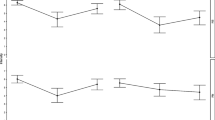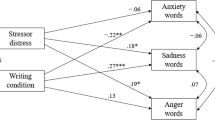Abstract
The authors hypothesized that writing longhand about a stressful experience, compared to typing, arouses greater negative emotion. Eighty college students were randomly assigned to describe either a neutral or stressful topic by typing or writing longhand, in a 2 × 2 factorial design. Students describing the stressful topic, compared to the neutral topic, wrote for a longer period, used more words, and reported greater negative and less positive affect. Consistent with prediction, writing about a stressful experience longhand induced greater negative affect than typing, and led to more self-rated disclosure. These findings suggest a method whereby therapists can help patients control their levels of negative affect when producing a trauma narrative.
Similar content being viewed by others
References
American Psychiatric Association (1994). Diagnostic and statistical manual of mental disorders (fourth edition). Washington, DC: American Psychiatric Association.
Brewin, C. R., Dalgleish, T., & Joseph, S. (1996). A dual representation theory of posttraumatic stress disorder. Psychological Review, 103, 670–686.
Gidron, Y., Peri, T., Connolly, J. F., & Shalev, A. Y. (1996). Written disclosure in posttraumatic stress disorder: Is it beneficial for the patient? Journal of Nervous and Mental Disease, 184, 505–507.
Greenberg, M. A., & Stone, A. A. (1992). Writing about disclosed versus undisclosed traumas: Immediate and long-term effects on mood and health. Journal of Personality and Social Psychology, 63, 75–84.
Pennebaker, J. W. (1997). Writing about emotional experiences as a therapeutic process. Psychological Science, 8, 162–166.
Pennebaker, J. W., & Beall, S. K. (1986). Confronting a traumatic event: toward an understanding of inhibition and disease. Journal of Abnormal Psychology, 95, 274–281.
Pennebaker, J. W., & Francis, M. E. (1996). Cognitive, emotional and language processes in disclosure. Cognition and Emotion, 10, 601–626.
Pillemer, D. B., Desrochers, A. B., & Ebanks, C. M. (1998). Remembering the past in the present: Verb tense shifts in autobiographical memory narratives. In C. P. Thompson, D. J. Herrman, J. D. Read, D. Bruce, D. G. Payne, & M. P. Toglia (Eds.), Autobiographical memory: Theoretical and applied perspectives (pp. 145–162). Mahwah, NJ: Erlbaum.
Pillemer, D. B., & White, S. H. (1989). Childhood events recalled by children and adults. In H. W. Reese (Ed.), Advances in child development and behavior (Vol. 21, pp. 297–340). Orlando, FI.: Academic Press.
Resick, P. A., & Schnicke, M. K. (1993). Cognitive processing therapy for rape victims. Newbury Park: Sage.
Spera, S. P., Buhrfeind, E. D., & Pennebaker, J. W. (1994). Expressive writing and coping with job loss. Academy of Management Journal, 37, 722–733.
Watson, D., Clark, L. A., & Tellegen, A. (1988). Development and validation of brief measures of positive and negative affect—the PANAS scales. Journal of Personality and Social Psychology, 54, 1063–1070.
Wells, A., & Matthews, G. (1994). Attention and emotion: A clinical perspective. Hove: Erlbaum.
Author information
Authors and Affiliations
About this article
Cite this article
Brewin, C.R., Lennard, H. Effects of Mode of Writing on Emotional Narratives. J Trauma Stress 12, 355–361 (1999). https://doi.org/10.1023/A:1024736828322
Issue Date:
DOI: https://doi.org/10.1023/A:1024736828322




